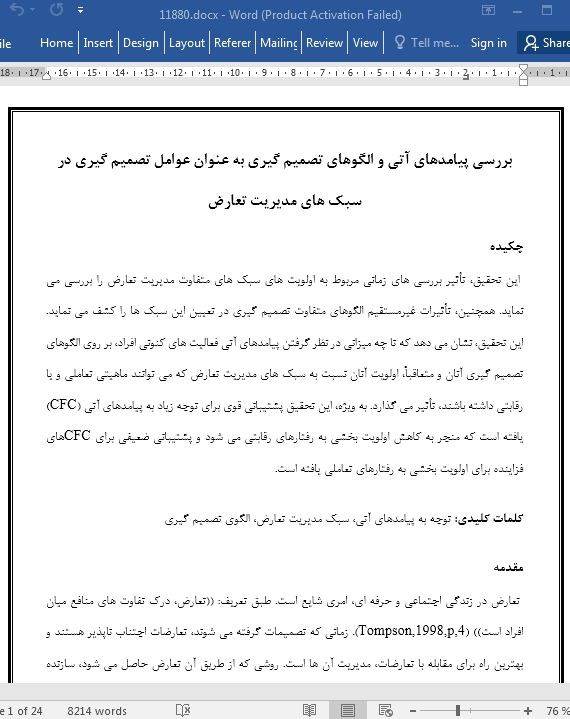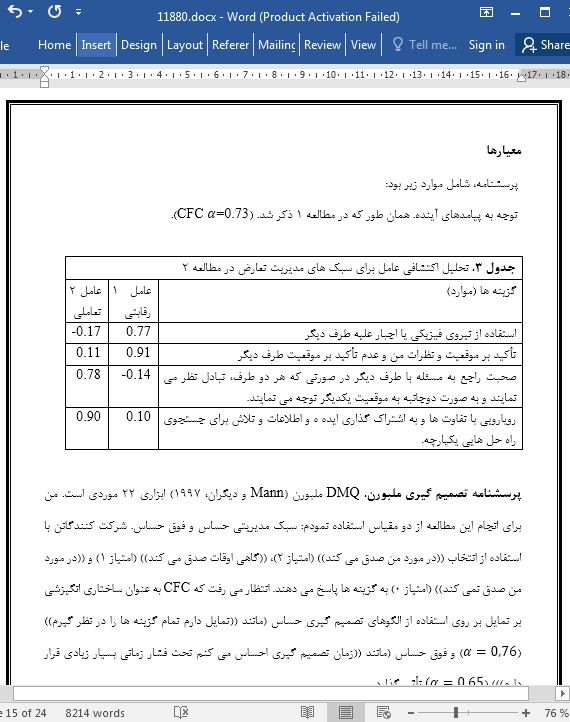
بررسی الگوهای تصمیم گیری به عنوان عوامل تصمیم گیری در سبک های مدیریت تعارض
چکیده
این تحقیق، تأثیر بررسی های زمانی مربوط به اولویت های سبک های متفاوت مدیریت تعارض را بررسی می نماید. همچنین، تأثیرات غیرمستقیم الگوهای متفاوت تصمیم گیری در تعیین این سبک ها را کشف می نماید. این تحقیق، نشان می دهد که تا چه میزانی در نظر گرفتن پیامدهای آتی فعالیت های کنونی افراد، بر روی الگوهای تصمیم گیری آنان و متعاقباً، اولویت آنان نسبت به سبک های مدیریت تعارض که می توانند ماهیتی تعاملی و یا رقابتی داشته باشند، تأثیر می گذارد. به ویژه، این تحقیق پشتیبانی قوی برای توجه زیاد به پیامدهای آتی (CFC) یافته است که منجر به کاهش اولویت بخشی به رفتارهای رقابتی می شود و پشتیبانی ضعیفی برای CFCهای فزاینده برای اولویت بخشی به رفتارهای تعاملی یافته است.
مقدمه
تعارض در زندگی اجتماعی و حرفه ای، امری شایع است. طبق تعریف: ((تعارض، درک تفاوت های منافع میان افراد است)) (Tompson,1998,p,4). زمانی که تصمیمات گرفته می شوند، تعارضات اجتناب ناپذیر هستند و بهترین راه برای مقابله با تعارضات، مدیریت آن ها است. روشی که از طریق آن تعارض حاصل می شود، سازنده بودن یا مخرب بودن آن را مشخص می نماید (Deutsch & Coleman, 2000). تعارضات می توانند سازنده باشند و تغییرات مثبتی را ایجاد نمایند و یا مخرب باشند و منجر به ایجاد تلفات، درد و رنج شوند (Kriesberg,1998). با توجه به مخاطرات زیادی که اغلب در مدیریت تعارضات نقش دارند، درک روانشناسی اولویت¬ های افراد در سبک های متفاوت مدیریت تعارض، حائز اهمیت است.
محدودیت ها
حوزه این تحقیق، محدود است؛ زیرا این تحقیق براساس اولویت های ارزیابی شده سبک های مدیریت تعارض است و نه رفتار حقیقی. هرچند همان طور که توسط Kim و Hunter (1993) در فراتحلیل ها نشان داده شده است رابطه نزدییکی بین قصد و نیت و رفتار وجود دارد، اما تحقیقات آتی برای آزمایش بیشتر این امر، لازم است. به علاوه، یکی از محدودیت های این تحقیق، استفاده از معیارهای خود-گزارش برای ارزیابی ساختارها استفاده شده در این مطالعات است.
Abstract
This research examines the influence of temporal considerations on preferences for different conflict management styles. It also explores the mediating effect of different decision-making patterns in determining these styles. This research proposes that the extent to which individuals consider future consequences of their current activities significantly influences their decision-making patterns and consequently, their preference for different conflict management styles which could be cooperative or competitive in nature. Specifically, this research found strong support for high consideration of future consequences (CFC) leading to a reduced preference for competitive behaviour, and weak support for high CFC leading to increased preference for cooperative behaviour.
Introduction
Conflict is common in social and professional life. By definition, “Conflict is the perception of differences of interests amongst people” (Thompson, 1998, p. 4). Conflicts are inevitable when decisions are taken, and the best way to deal with conflicts is to manage them. The way in which conflict is approached determines whether it is constructive or destructive (Deutsch & Coleman, 2000). Conflicts can be constructive, bringing about positive change; or destructive, leading to losses, pain and misery (Kriesberg, 1998). Given the high stakes often involved in managing conflicts, it is important to understand the psychology behind individuals’ preferences for different conflict management styles.
Limitations
The scope of this research is restricted as the focus of this research is on measuring preferences for conflict management styles and not actual behaviour. Although there is a close relationship between intentions and behaviour as shown in the meta-analysis by Kim and Hunter (1993), future research is required to test it further. In addition, one limitation of this research is the use of self-report measures to assess the constructs used in the studies.
چکیده
مقدمه
توجه به پیامدهای آتی
الگوهای تصمیم گیری
تحقیق حاضر: مدل فرضی
سبک های مدیریت تعارض-CFC
تأثیر غیرمستقیم الگوهای تصمیم گیری
مطالعه اول
شرکت کنندگان
روند کار
نتایج و بحث
مطالعه دوم
شرکت کنندگان
روند کار
معیارها
نتایج و بحث
آزمایش مدل ساختاری
بحث کلی
محدودیت ها
مفاهیم و جهت گیری هایی برای تحقیقات آتی
منابع
Abstract
Introduction
Consideration of future consequences
Decision-making patterns
The present research: hypothesised model
CFC –Conflict management styles
Mediating effect of decision-making patterns
Study 1
Participants
Procedure
Measures
Results and discussion
Study 2
Participants
Procedure
Measures
Results and discussion
Testing structural model
General discussion
Limitations
Implications and directions for future research
References
- اصل مقاله انگلیسی با فرمت ورد (word) با قابلیت ویرایش
- ترجمه فارسی مقاله با فرمت ورد (word) با قابلیت ویرایش، بدون آرم سایت ای ترجمه
- ترجمه فارسی مقاله با فرمت pdf، بدون آرم سایت ای ترجمه



